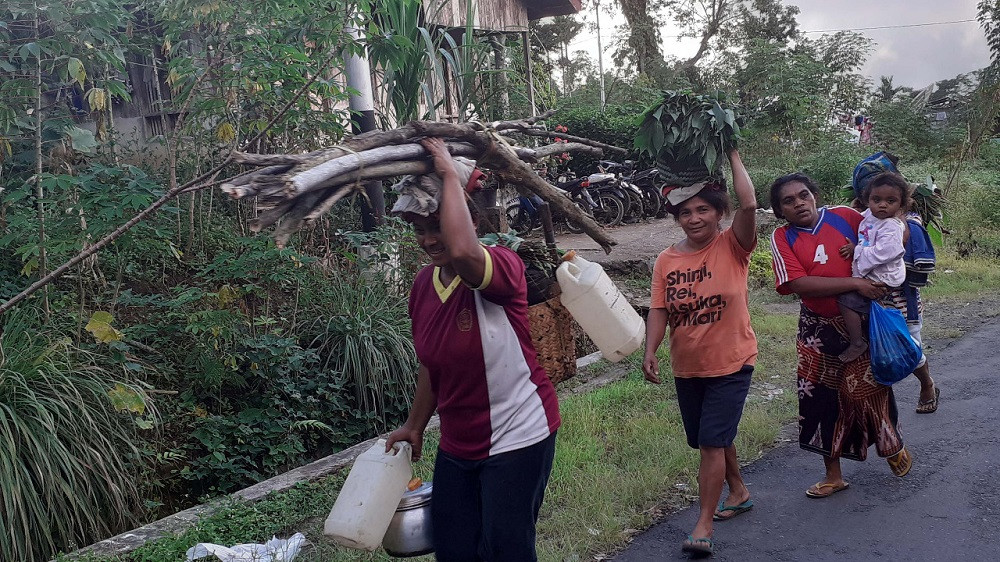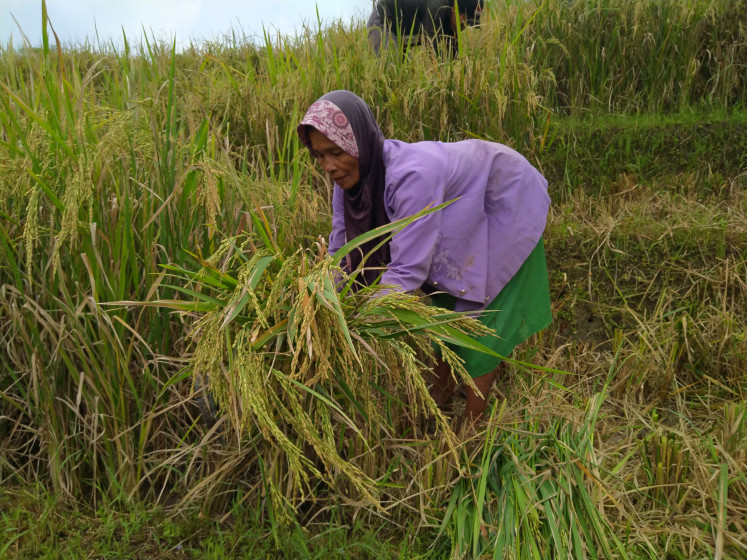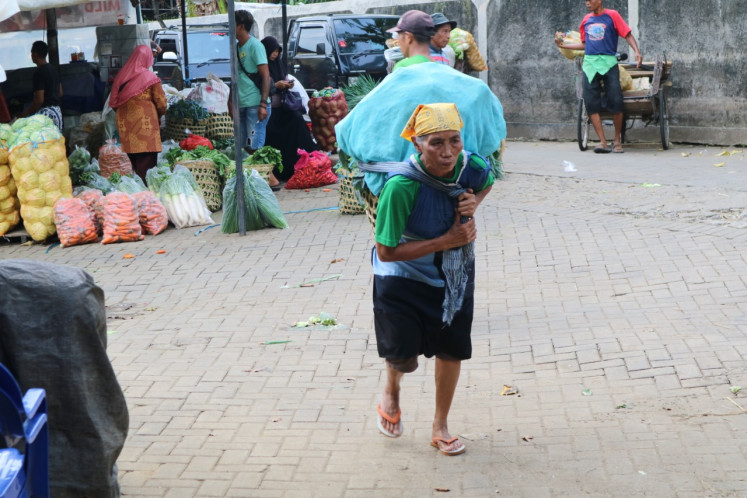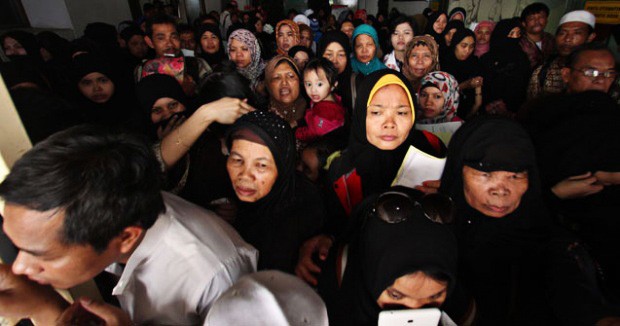Popular Reads
Top Results
Can't find what you're looking for?
View all search resultsPopular Reads
Top Results
Can't find what you're looking for?
View all search resultsPandemic hits women in informal work hardest
Around 74 million people, 56 percent of nation’s workforce, in informal sector
Change text size
Gift Premium Articles
to Anyone
A
year into the COVID-19 epidemic in Indonesia, many are struggling for survival with limited income and access to food. But women in informal work have proven to be resilient, as they faced challenges head on while navigating the intricacies of traditional gender roles that call for them to be caretakers and housewives.
The informal work sector has been a significant source of employment and income for women in Indonesia, with many engaging in part-time jobs. Based on Statistics Indonesia (BPS) data from last year, some 56 percent of the nation’s total workforce, or around 74 million people, work in the informal sector.
And while women have been doing most of the world’s lowly-paid jobs even before the onset of the pandemic, women in the informal sector are often unseen or left behind, especially when the government does not provide adequate legal recognition for their work.
So how are women in informal work surviving the epidemic?
Farmers and produce sellers
When the government ordered restaurants to shutter after the first known cases of COVID-19 emerged in March last year, the impact was felt far and wide across the supply chain. At the very beginning of the chain, farmers struggled to maintain their cash flow due to fewer consumers, despite the abundance of produce they sold.
“Female farmers are disproportionately impacted because their role is considered to be that of managing their family’s finances – the one who manages the husband’s income,” said Sana Ullaili of the Kinasih Women’s Solidarity (SP Kinasih) group, an NGO in Yogyakarta focused on empowering women in food security and land rights.
“Whether or not the income is sufficient, it is the woman who has to deal with it. That is why they are often expected to seek out additional income.”
With sales of agricultural products plummeting by around 50 percent compared to prepandemic times, according to the NGO, the disruption brought about by COVID-19 has also piled on work for women, who also take on child rearing responsibilities and house work.
As the COVID-19 pandemic exacerbates existing economic and gender inequalities, female farmers in Kulon Progo, Yogyakarta have been struggling to find alternative sources of income while they juggle work, child rearing and other household responsibilities. (Courtesy of/SP Kinasih Yogyakarta)To subsist and feed their families, female farmers are often forced to take up additional jobs, even though farming requires them to be out on the field most of the day.
“Even so, women always manage to find ways to deal with a food shortage, or any other problem they face in society or within their families. So even with the pandemic, they are able to survive,” Sana said.
With assistance from SP Kinasih, female farmers in Kulon Progo, for instance, have moved their usual village market sales online. An online platform set up for the women allows them to sell their produce while limiting physical contact. It also provides them with additional income, even though it usually means a few more extra hours of work.
Porters and home-based workers
The twin health and economic crises of the pandemic are particularly harsh for unregistered, unregulated and unprotected occupations such as porters and home-based workers. This is especially true for the women working in this field in and around Yogyakarta.
Home-based workers are people who are subcontracted to produce goods or services in their homes for domestic or global markets, such as traditional craft artisans.
“Female porters and home-based workers are not getting enough protection, especially during this pandemic,” said Amin Muftiyanah from Yayasan Annisa Swasti (Yasanti), another local NGO focusing on women’s empowerment.
Porters in Giwangan and Beringharjo, for instance, have no choice but to ply their trade at crowded markets in spite of the pandemic, by living off of daily earnings.
They earn up to Rp 50,000 per day on average, but since people have stopped going to the market due to pandemic-era mobility restrictions, these women are now earning less than Rp 30,000 a day.
“Even with such meager earnings, they still have to spend it on food and drinks, transportation and public restroom fees,” Amin said.
Female porters in Giwangan market in Yogyakarta can carry more than eight kilograms of goods on their back on a daily basis just to survive. However, as people stopped coming to markets due to the COVID-19 pandemic, these women have had too work harder and seek alternative earnings. (Courtesy of/Yasanti Yogyakarta)He notes that restroom fees are an annoyance for the women, whose energy-sapping occupation requires them to bear more than 8 kilograms of goods on their back every day.
“But even though most of them are old, they are also tough as nails. They are like superheroes,” he added.
Without a safety net to fall back on, female porters must spend extra hours learning about digital marketing. Some even use online platforms to sell food and beverages to increase their earnings.
Similarly, women working as home-based workers are receiving fewer orders due to supply chain disruptions, business shutdowns and the associated economic fallout, according to Yasanti.
Besides being categorized as informal workers, women working in this field are often isolated and invisible – most do not qualify for government COVID-19 assistance, the NGO said.
In spite of this, these women are often the ones producing face masks and other protective gear, keeping up with public demand while earning a little something on the side.
Migrant domestic workers
Despite their enormous contributions to the running of households and a host country’s economy, female migrant domestic workers have been prone to more exploitative working conditions during the COVID-19 pandemic.
For live-in domestic workers who not only work but also live in the house of their employers, work-from-home conditions may increase their vulnerability to overwork or even abuse, according to advocacy groups.
“Workloads are getting heftier and working hours longer. Employers, who used to go to the office and eat out, now stay at home all day; meaning that house work will increase,” said Novia, a live-in domestic worker in Singapore from Lumajang, East Java.
Indonesian migrant workers in Saudi Arabia queue for an immigration check in their way to go home. (Tempo/-)Novia, who is also an activist that encourages other domestic workers to share their stories through social media, said she had been receiving three times more counseling requests from fellow workers than usual.
The pandemic has taken a great toll on migrant domestic workers’ mental health, mostly due to tighter mobility controls and home confinement imposed by their employers.
Some domestic workers, she said, were forbidden from leaving the house and were expected to work on their days off without compensation, while others had their salary cut.
“Domestic workers are left with little choice,” Novia said.
It is even worse for domestic workers who want to seek protection from abuse because safehouses or shelters are no longer accepting people due to social restrictions.
To cope with the pandemic, Novia said she was encouraging her fellow workers to listen to each other’s stories on social media, so they were not only aware of the coronavirus disease but also supported one another.













